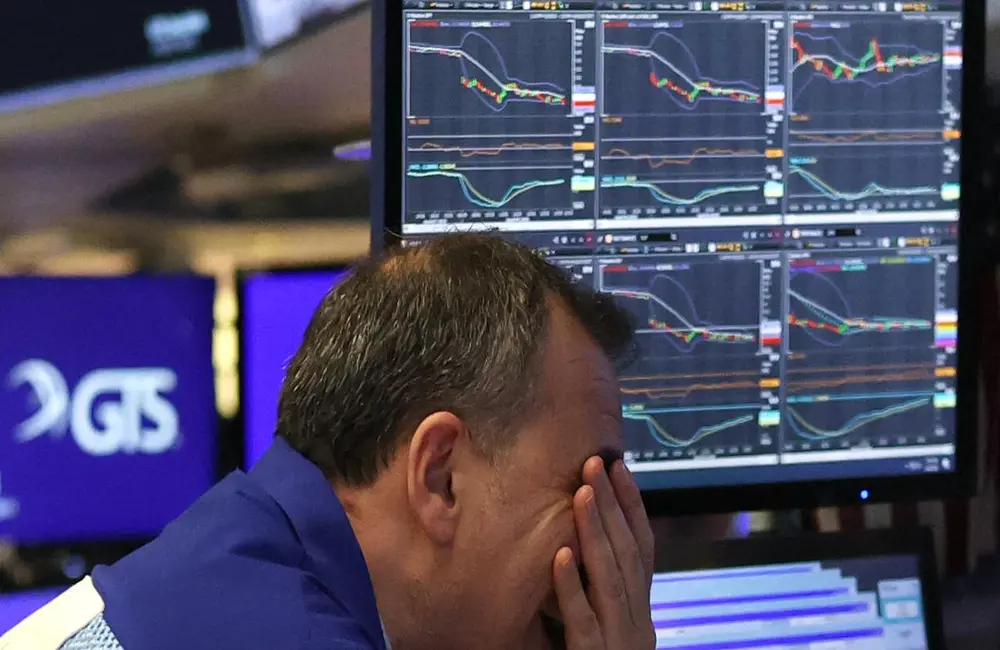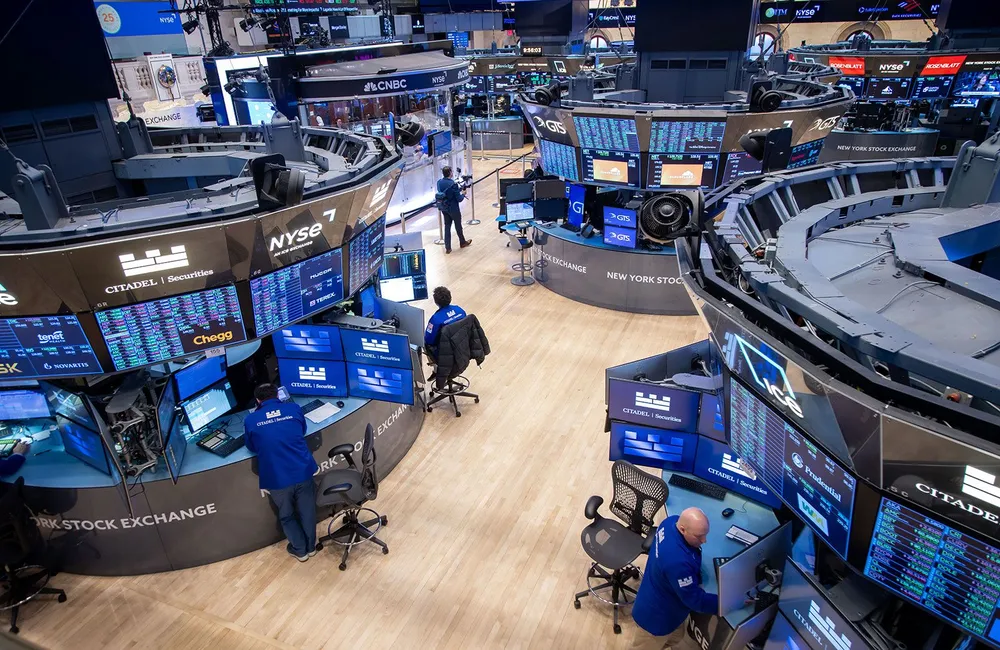After a fairly muted week for global indices, investors remain cautious about the outlook for interest rates and the economy. The Australian sharemarket will be closed today in honor of Good Friday.
ASX futures were leaning higher Friday morning, having added 9 points or 0.1% as of 6:00am.
US stocks inched higher Thursday, recovering from earlier losses after new US jobless claims data suggested that layoffs have recently increased more than previously thought.
The S&P 500 closed up 0.4% while the Dow Jones Industrial Average ended flat. The tech-heavy Nasdaq Composite rose 0.8%.
Stocks have shown little momentum in either direction this week after notching sizeable gains last week. Investors remain optimistic that recent strains in the banking sector won't lead to a full-blown crisis and are also cheered by signs that the Federal Reserve may be nearly done raising interest rates. But they remain on edge about the economic outlook, with recent data providing some cause for concern.
In commodity markets, Brent crude oil shed 0.1% to $US84.92 a barrel while gold lost 0.7% to US$2,006.44.
Australian government bonds dipped lower, with the 2 Year yield down to 2.82% and the 10 Year yield falling to 3.18%. US Treasury notes also fell, with the 2 Year yield declining to 3.82% and the 10 Year yield slipping to 3.30%.
The Australian dollar slipped to 66.74 US cents, down from its previous close of 67.19. The Wall Street Journal Dollar Index, which tracks the US dollar against 16 other currencies, edged up to 95.80.
Asia
Chinese shares ended Thursday mixed, extending this week’s muted trading pattern. The benchmark Shanghai Composite Index closed flat at 3312.63 while the Shenzhen Composite Index fell 5.2 points. The ChiNext Price Index managed a 0.2% rise. Precious metal miners outperformed amid continued strength in gold prices thanks to a risk-off sentiment. Zhongjin Gold jumped 4.5% and Shandong Gold-Mining added 9.2%. But those gains were offset by weakness in a wide range of sectors, including advertising, software development and education.
Hong Kong's benchmark Hang Seng Index closed flat at 20331.20, following the release of upbeat Caixin China services PMI data. The indicator rose to its highest level in 28 months for March, signaling continued consumption recovery after Beijing eased Covid-19 restrictions. Chinese chip foundry SMIC rose 7.7%. Tech companies reversed morning losses, with the Hang Seng Tech Index up 0.1%. Alibaba Group added 2.2% and Xiaomi Corp rose 0.8%. Property developers declined. Longfor Group Holdings dropped 2.5% and Country Garden Holdings fell 2.4%.
Japan's Nikkei Stock Average fell 1.1% to close at 27507.65. Weak US economic data released Wednesday have deepened concerns that the Fed’s aggressive monetary tightening stance could tip the US economy into a recession, said Priyanka Sachdeva, market analyst at Phillip Nova. Losses on the benchmark index were broad-based with Mazda Motor slipping 5.0%, Lasertec falling 4.9% and Tokyo Electron down 4.5%.
India's benchmark Sensex index closed 0.2% higher at 59832.97, after the Reserve Bank of India unexpectedly kept its policy rate unchanged amid growing uncertainty over the global economic outlook. "Equity and bond markets could justifiably get excited as a knee jerk reaction to growth and inflation headwinds appearing less severe than earlier feared," said Dhiraj Relli, managing director and CEO at HDFC Securities. Auto stocks lifted the Sensex higher, with Tata Motors advancing 2.6%, Mahindra & Mahindra adding 1.3% and Maruti Suzuki India up 0.7%. Other gainers included Bajaj Finance and IndusInd Bank, which closed 2.9% and 1.8% higher, respectively.
Europe
European stocks rose ahead of the four-day Easter break as concerns over financial stability continued to ease in the absence of fresh banking sector shocks. "The lack of bad news this week has helped drive indices higher, with the gradual improvement in European services [purchasing managers' index data on Wednesday] showing that there is room for optimism when it comes to economic activity over the summer months," CMC Markets analyst Michael Hewson wrote.
The pan-European Stoxx Europe 600 gained 0.5%, the German DAX increased 0.5% and the French CAC 40 climbed 0.1%. Travel group TUI led gains on the Stoxx, rising 8.9%, after saying it expects a "good summer" following strong Easter bookings.
The United Kingdom’s FTSE 100 index ended the week on a positive note, closing up 1% at 7741.56 ahead of the Easter weekend. "It has been another good week for the FTSE 100, on course for its third successive weekly gain, although it remains well short of its March peaks, with banks and commercial real estate still some way short of returning to the levels we saw at the beginning of March," Michael Hewson explained. Admiral Group ended up 3.6% and tops the British blue-chip index at market close along with United Group and Land Securities Group, having both gained more than 3%.
North America
US stocks inched higher Thursday, recovering from earlier losses after new jobless claims data suggested that layoffs have recently increased more than previously thought.
The S&P 500 closed up 0.4% while the Dow Jones Industrial Average ended flat. The tech-heavy Nasdaq Composite rose 0.8%.
Stocks have shown little momentum in either direction this week after notching sizeable gains last week. Investors remain optimistic that recent strains in the banking sector won't lead to a full-blown crisis and are also cheered by signs that the Federal Reserve may be nearly done raising interest rates. But they remain on edge about the economic outlook, with recent data providing some cause for concern.
"We really are in a range and we have been for a while now," said Michael Antonelli, market strategist at Baird.
The good news, Mr. Antonelli said, is investors can focus on economic data, without worrying too much that a banking crisis will make the reports irrelevant. Investors can also worry less than in the past that good economic data would be bad for stocks by leading to supersized interest rate increases. Still, he said, stocks remain in something of a rut because economic reports keep sending different signals, making it hard to know if the economy is in good shape or heading toward a recession.
Thursday's jobless claims data provided the latest evidence that the labor market might finally be cooling.
Claims, a proxy for layoffs, totaled 228,000 last week on a seasonally adjusted basis. That was down from 246,000 the previous week. However, large revisions to past weeks, based on changes in how the government strips out seasonal fluctuations in economic activity, indicated that layoffs have been much higher this year than previously reported.
Bank stocks were among the better performers Thursday. Shares of the regional bank Western Alliance were up 4.8% after dropping 12% Wednesday when it disclosed a plunge in deposits in the final weeks of March. Larger banks also climbed, with Wells Fargo gaining 2.7%.
Shares of Costco, meanwhile, dropped 2.2% after the warehouse retailer reported a monthly drop in same-store sales, the first decrease by that measure since 2020.
Investors' focus will now turn to the March jobs report due Friday, when equity markets will be closed and the bond market trading session will be abbreviated.




















